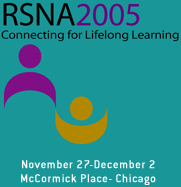
Abstract Archives of the RSNA, 2005
Ernesto Mazza MD, Abstract Co-Author: Nothing to Disclose
Silvia Lucarini MD, Presenter: Nothing to Disclose
Lapo Sali MD, Abstract Co-Author: Nothing to Disclose
Massimo Falchini MD, Abstract Co-Author: Nothing to Disclose
Cristina Maddau, Abstract Co-Author: Nothing to Disclose
Marzia Matucci, Abstract Co-Author: Nothing to Disclose
To evaluate the outcome and complications of CT-guided percutaneous drainage of antibiotic therapy resistant lung abscesses.
From December 2000 to December 2004, 13 patients (age 26-76 years) with bacterial lung abscess, resistant to antibiotic therapy, underwent CT-guided drainage.
In all cases cytological diagnosis was confirmed by CT-guided fine needle aspiration. For the drainage we used: in 5 patients a 21 G Chiba needle, in 2 patients a 18 G Chiba needle, in 6 patients a 14 Fr catheter which was positioned mean Seldinger technique.
CT scans were obtained in all patients before, during and after the drainage. CT was repeated every month until complete resolution of the abscess was observed.
All patients received antibiotic therapy based on the antibiogram obtained after aspiration.
Complete resolution of the lesions was obtained in all cases.
The mean period of hospitalization was 5 days. Drainages were left in place for 7 days. Clinical resolution occurred after a mean time of 2 days, while resolution on CT images was visible in most cases after one month.
Pneumothorax occurred in two patients and was treated by positioning in the same session a pleural drainage.
Percutaneous drainage of lung abscess showed to be a safe, low-cost procedure, burdened with an acceptably low incidence of complications.
Mazza, E,
Lucarini, S,
Sali, L,
Falchini, M,
Maddau, C,
Matucci, M,
CT-guided Percutaneous Drainage of Antibiotic Resistant Lung Abscess. Radiological Society of North America 2005 Scientific Assembly and Annual Meeting, November 27 - December 2, 2005 ,Chicago IL.
http://archive.rsna.org/2005/4412557.html

